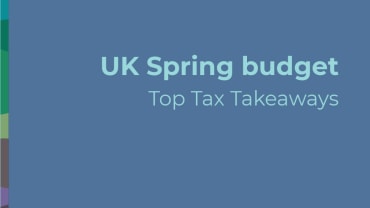1. The UK Government has announced £30bn of measures to address the economic impact of coronavirus:
- £5bn in extra funding is being provided to the NHS;
- Statutory Sick Pay (SSP) can be claimed by self-isolating individuals from the first day of absence;
- Eligible SME employers will be able to claim a refund of SSP costs from the Government, limited at two weeks per employee;
- Business rates relief, business interruption loans and extra time to pay tax liabilities have also been made available.
2. Entrepreneurs' relief will be limited to the first £1m of lifetime gains (reduced from £10m) from 11 March 2020. Special rules may apply to restrict the relief on transactions that have sought to obtain a timing advantage by concluding contracts prior to 11 March 2020.
3. Significant reductions were announced to business rates in England; there will be no business rates at all for most small businesses in 2020/21, a £5,000 discount for pubs and a £3,000 cash grant for businesses that do not pay rates. A review of business rates later this year was also announced.
4. Unusually, there have been no changes to UK income tax rates and bands, nor the personal allowance. From April 2020, the thresholds at which national insurance contributions (NICs) start to be paid by employees and the self-employed will increase from £8,632 to £9,500 per year. (The threshold at which employers pay appears to be unchanged). Employment allowance (which reduces eligible employers' NIC liability) is also increased from April 2020, from £3,000 to £4,000.
5. The planned reduction in corporation tax to 17% has been cancelled, and the tax rate will be frozen at 19%. This is by far the biggest "tax-raising" measure in the Budget _ projected to save around £33bn.
6. The pension taper threshold will be increased by £90,000 - reflecting the Conservative manifesto pledge to combat the so-called doctors' pension taper, and aligning with the Budget's other measures aimed at bolstering the NHS. From 2020/21 the threshold income will be £200,000. The annual allowance taper will only apply to those with an adjusted annual income of more than £240,000.
7. A 2% SDLT surcharge on non-UK residents purchasing residential property in England and Northern Ireland will be introduced, but not until 1 April 2021. The surcharge is lower than the 3% which had been suggested previously.
8. A plastic packaging tax will apply from 2022 to plastics that are manufactured or imported into the UK and contain less than 30% recycled plastic payable by the manufacturer or importer. The Government's consultation on this new tax is open until 20 May 2020.
9. All alcohol duties are frozen _ only the second time this has happened in living memory.
10. The Government will reduce VAT on women's sanitary products from 5% to 0% from 1 January 2021. This follows years of persistent lobbying from activists and a release from EU VAT rules at the end of the transition period. The VAT zero rate will also be extended to e-publications such as e-books and e-journals from 1 December 2020, in line with the zero rate for paper publications.













